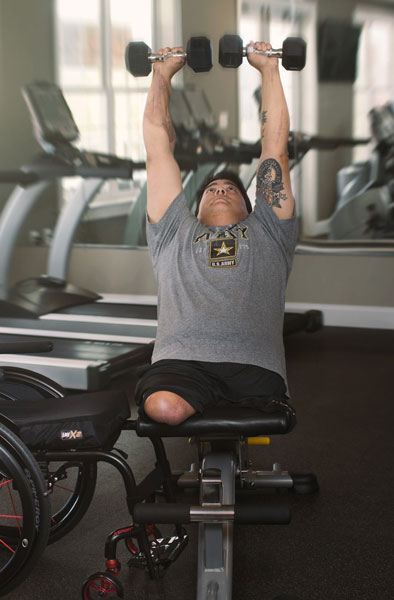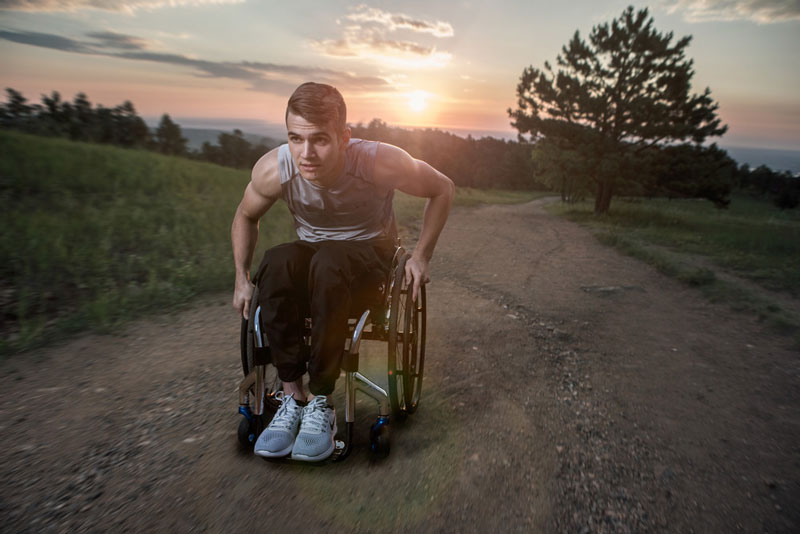I've been on this planet for 31 years and have been a quad-amputee for just about the same amount of time. Growing up, and even now, I've always been more sensitive to the heat than others. I tend to sweat more than most able-bodied people that I know, and I don't wear a jacket nearly as often. I'm sure that living in Florida has something to do with that, though I have been known to be comfortable in a tank top in temperatures around 30 to 40 °F (-1 to 4 °C). I've been told that I'm crazy, and that there's no way that I couldn't be cold in those temperatures. In doing my research for this article, I've learned that my experiences with temperature are common among amputees.

So, why write this blog? Though I live in Florida, I'm often hotter than most of the people I know. And no, I'm not bragging. In fact I can feel perspiration on my back as I'm typing this. And yes: my fan is on high, and my air conditioning is set to around 72 °F (22 °C). As a person with a disability, I figure that I'm not the only one facing this dilemma. So here are some scientific facts about heat, perspiration, the body, and how people with disabilities can stay cool while remaining healthy and safe.
Let's start by speaking a bit about heat and how the body deals with it. When we exert any kind of energy, our body produces heat. As that heat continues to build, our core temperatures obviously increase. To deal with the increase in temperature, our skin perspires. Our sweat is intended to cool down the surface of our bodies by interacting with the air. In a natural setting, perspiration evaporates as the skin cools, which lowers the body's temperature.
In reality, each of our bodies is not the same. Some of us have bodies that don't function in a typical way, mine included. As people with a disability, dealing with increased temperatures can exacerbate any health risks that we may already have. For instance, wheelchair users with varying kinds of disabilities are highly encouraged to maintain a proper pressure relief regimen. If we also consider the heat as well as the potential to perspire, maintaining a standard for pressure relief may need to include a method to compensate for increased temperatures.
People who either have difficulty shifting their weight or those who need assistance to do so should pay close attention to perspiration. If a part of your body sweats, but there is no way for that sweat to evaporate, it will continue to rest on your skin and cause irritation. When sweat gets trapped against the skin and can't evaporate, bacteria flourish. When dealing with seating and positioning, we place an emphasis on skin integrity. In plain English, we want to make sure that your skin remains healthy and free of any sores, abrasions, irritations, or any other abnormalities. As a means of preventing such complications, you can use a variety of products, including various kinds of medicated powders and lubricants. They are intended to prevent chafing or may act as a protective lubricant which coats the skin. A few examples include: Derma Prevent, ChafeZone, and Second Skin.
Coinciding with skin integrity, many people are also incapable of regulating body temperature. People with spinal cord injuries may be incapable of sweating, thus creating issues for the body's temperature regulation. Without the ability to sweat, the body is at increased risk of heat stroke and related injuries. Blood circulation also plays an important role. Some spinal cord injuries may restrict the body's ability to redistribute blood flow, meaning that muscles may not be getting enough blood flow. If this is the case, muscles won't get the oxygen they need in order to function.

Similar to people who have a spinal cord injury, disabilities resulting from diagnoses such as muscular dystrophy (MD) can also affect body temperatures. For those who are unaware, people with MD experience a decrease in muscle mass. The speed of muscle deterioration can depend on the type of MD, which may also have an impact on the disease's progression. Resulting from a loss in muscle mass, people who are diagnosed with MD may also have difficulty regulating body temperature. Since the muscle is deteriorating, less blood flows through those muscles, which complicates the process of regulating the body's temperature.
How do you prevent heat exhaustion and stay cool if you have sustained a spinal cord injury? As with everyone, it is important to make sure that people with spinal cord injuries stay properly hydrated. It may also be helpful to alter the intensity of activities or to stay in a cooler environment. Often, especially for those of us in very hot places like here in Florida, that may mean exercising in a temperature-controlled environment. Light, breathable clothing is recommended. Try to become acclimated to exercising in hot environments gradually. There are products available that can help deal with the heat, from a cold wet towel to cooling bands that are designed to wrap around the neck. It is important to remember that your neck plays a large role in regulating body temperature; applying a cold water bottle to it may be a big help. Misting the surface of the skin with cool water may also help to maintain a healthy body temperature. Additionally, athletic clothing is often created out of material that helps keep the body cool.
Generally, temperature regulation seems to be a fairly common problem dealt with by people who have varying types of disabilities. If you do have issues with the heat or cold, consult your physician. In writing this piece, I've certainly learned a lot about my own body and its ability to cool down. So, for the rest of the summer, pay close attention to the heat. If you have difficulty regulating your body temperature, stay in the shade as much as possible and be sure to keep hydrated.
About the Author
Around the age of one, I contracted bacterial meningitis. When I was three, I began using a power wheelchair. I've always embraced my disability and taken pride in knowing that I was different than my peers. My desire to learn more about disability led me to study critical disability theory both as an undergrad and a graduate student. I've always been passionate about gaming, which influenced me to write my Master's thesis on accessibility and video games as it relates to gamers with disabilities. In my spare time I love competing in local tournaments for Super Smash Bros., reading fantasy and sci-fi novels, and writing.
Kyle's ride is a QUICKIE S-636.
Most of the stories here on LiveQuickie.com were submitted by readers. Do you have a story to tell? We'd love to hear it. Submit your story here.